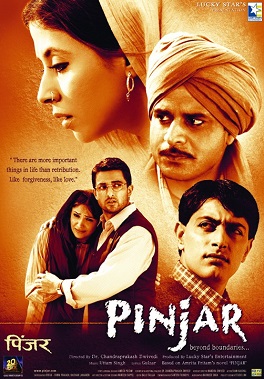
Pinjar, starring Urmila Matondkar in perhaps her most significant role, suffers occasionally from some low production values and spotty direction. But the subject the movie deals with is so stirring that this doesn't matter after you've seen the film. Form and beauty and technical perfection are just side-factors for this film; its main subject matter is powerful enough to keep the viewer fascinated with horror and distaste for hours after the film ends.
The film's theme is isolation. Its atmospheric fear stems from the society's pervasive oppression, and rejection, of women. Identifying with Puro (Urmila's character), the viewer slowly becomes aware of the level of isolation a woman was (and still is) subject to in traditional "honour"-oriented societies with a tribal social structure which regard women as property. The Partition of India, which led to some of the worst civic atrocities of the 20th century, enhances and completes the isolation. Puro's sense of being stranded alone among aliens drives the emotional charge of this movie.
Set in 1946, just before Partition, the film is about Puro, the eldest daughter of a Punjabi Hindu family, spending her time with her mother, sisters and a doting brother whom she is particularly close to. Puro's life is a picture of perfect family bliss until her father brings his family to their native village to settle her marriage. Unknown to Puro, her ancestors, who had been dominant in the village two generations ago, visited atrocities on the Muslims two generations ago. Times have changed now: Muslims are dominant in the village and are thirsting for some payback. This sets Puro up for a horrifying ordeal: she is abducted by a Muslim man, Rashid (Manoj Bajpai), and slowly loses all hope of being reunited with her family (or indeed anyone from Hindu society).
Manoj Bajpai was consummate as Rashid; I find it surprising the Bollywood doesn't use him more. Urmila did a good job with Puro. With most of the other actors I had a vague sense that they were a little wooden. But I hardly noticed this; it is just a vague impression in the back of my mind, which was almost completely absorbed by the events that were depicted. This is a movie where it is hard to separate the quality of performances from the subject matter. The same is true for the sets and realization of the surroundings; some of them looked inauthentic, like stage sets. The music in this movie was atrocious, and songs burst out of nowhere in the most incongrous Bollywood style possible. The entire first half-hour was over-developed and forgettable. But the story was so absorbing that all of this didn't matter.
To me, Pinjar was very educational about an alien aspect of North Indian (and Pakistani) culture. I once spoke with an expert on South Asia who gave me a convincing explanation for women-as-property attitude. Historically, for warring tribes that needed constant supplies of warriors, women were valuable as child-bearing instruments; so valuable that it was acceptable to abduct women for their child-bearing potential. These attitudes persist in some regions of Northern India and Pakistan even today; stories about abduction of Hindu women in Pakistan still appear from time to time in newspapers. (Presumably the same attitudes ossified and later included atrocities such as honour killings.) Pinjar depicts the extent to which such abductions had become part of the culture: everyone is depicted as being complicit in the abductions; entire villages colluded to hide abductees from government authorities. Paradoxically, the abducted women are not treated unkindly; they are in fact encouraged to integrate and lead "productive" lives. The unkindness is restricted to the abduction.
There are a few other aspects of the movie worth mentioning, such as Rashid's reluctance: he doesn't want to abduct Puro, but his family's "honour" demands it. Bajpai captures Rashid's conflicted personality well. The various depictions of other atrocities during the times of partition, such as the large scale killings, also stand out. Two scenes in particular come to mind. The first is the palpable tension when Ramchand (Sanjay Suri), Puro's erstwhile fiancee, runs from a frenzied mob after Partition is announced in 1947. The other is the sense of utter helplessness when Lajjo (Sandali Sinha), Ramchand's sister, is abducted right in front of him from a supposedly secure police-protected refugee camp. There's one scene where Puro meets her parents after being abducted; it was probably the strongest scene but for some reason struck me in a surreal rather than visceral way. The movie does have moments of reconciliation as well towards the end, but in some ways they were as disturbing as the rest of the film. In Stockholm-syndrome-esque ending, Puro reveals the extent to which she is tied emotionally to her new life with Rashid. Even though I know this is what really happened with scores of Hindu abductees, it is still hard for me as a viewer to accept or believe at an emotional level.
Pinjar should not be watched for its film-making brilliance (it's got too many flaws) or its entertainment value (those elements are seriously inferior in this film). It should be watched to get a small sense for the terrors experienced by people and abductees and their families during Partition.
No comments:
Post a Comment